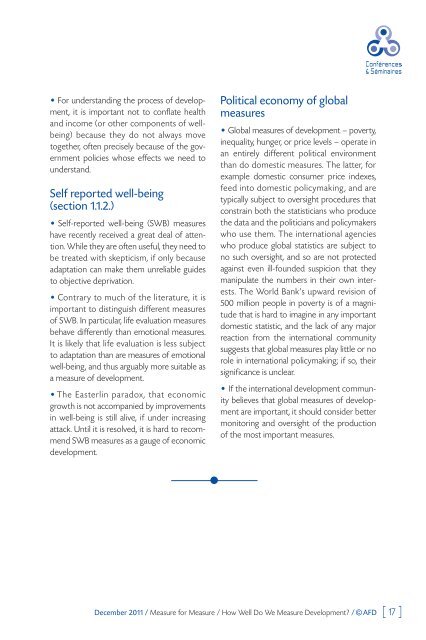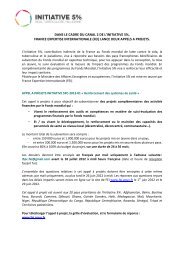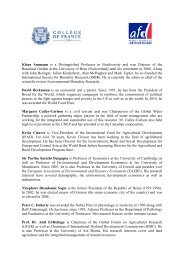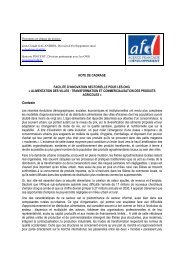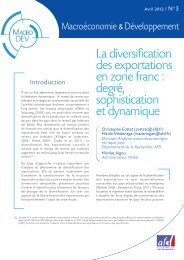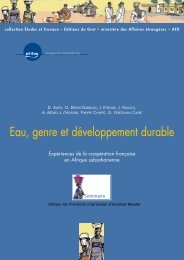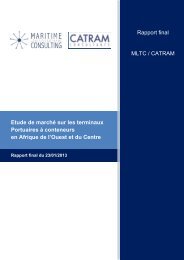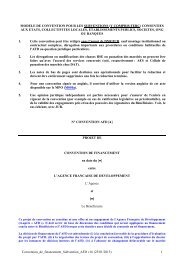Paris School of Economics - L'Agence Française de Développement
Paris School of Economics - L'Agence Française de Développement
Paris School of Economics - L'Agence Française de Développement
You also want an ePaper? Increase the reach of your titles
YUMPU automatically turns print PDFs into web optimized ePapers that Google loves.
• For un<strong>de</strong>rstanding the process <strong>of</strong> <strong>de</strong>velopment,<br />
it is important not to conflate health<br />
and income (or other components <strong>of</strong> wellbeing)<br />
because they do not always move<br />
together, <strong>of</strong>ten precisely because <strong>of</strong> the government<br />
policies whose effects we need to<br />
un<strong>de</strong>rstand.<br />
Self reported well-being<br />
(section 1.1.2.)<br />
• Self-reported well-being (SWB) measures<br />
have recently received a great <strong>de</strong>al <strong>of</strong> attention.<br />
While they are <strong>of</strong>ten useful, they need to<br />
be treated with skepticism, if only because<br />
adaptation can make them unreliable gui<strong>de</strong>s<br />
to objective <strong>de</strong>privation.<br />
• Contrary to much <strong>of</strong> the literature, it is<br />
important to distinguish different measures<br />
<strong>of</strong> SWB. In particular, life evaluation measures<br />
behave differently than emotional measures.<br />
It is likely that life evaluation is less subject<br />
to adaptation than are measures <strong>of</strong> emotional<br />
well-being, and thus arguably more suitable as<br />
a measure <strong>of</strong> <strong>de</strong>velopment.<br />
• The Easterlin paradox, that economic<br />
growth is not accompanied by improvements<br />
in well-being is still alive, if un<strong>de</strong>r increasing<br />
attack. Until it is resolved, it is hard to recommend<br />
SWB measures as a gauge <strong>of</strong> economic<br />
<strong>de</strong>velopment.<br />
Political economy <strong>of</strong> global<br />
measures<br />
• Global measures <strong>of</strong> <strong>de</strong>velopment — poverty,<br />
inequality, hunger, or price levels — operate in<br />
an entirely different political environment<br />
than do domestic measures. The latter, for<br />
example domestic consumer price in<strong>de</strong>xes,<br />
feed into domestic policymaking, and are<br />
typically subject to oversight procedures that<br />
constrain both the statisticians who produce<br />
the data and the politicians and policymakers<br />
who use them. The international agencies<br />
who produce global statistics are subject to<br />
no such oversight, and so are not protected<br />
against even ill-foun<strong>de</strong>d suspicion that they<br />
manipulate the numbers in their own interests.<br />
The World Bank’s upward revision <strong>of</strong><br />
500 million people in poverty is <strong>of</strong> a magnitu<strong>de</strong><br />
that is hard to imagine in any important<br />
domestic statistic, and the lack <strong>of</strong> any major<br />
reaction from the international community<br />
suggests that global measures play little or no<br />
role in international policymaking; if so, their<br />
significance is unclear.<br />
• If the international <strong>de</strong>velopment community<br />
believes that global measures <strong>of</strong> <strong>de</strong>velopment<br />
are important, it should consi<strong>de</strong>r better<br />
monitoring and oversight <strong>of</strong> the production<br />
<strong>of</strong> the most important measures.<br />
December 2011 / Measure for Measure / How Well Do We Measure Development? / © AFD [ 17<br />
]


